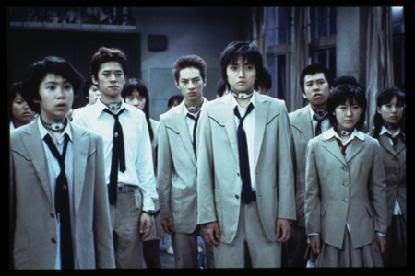
I've been lagging a bit in posting, for a number of reasons, but they are all extremely boring (family, work, sickness, and laziness among them.) I did manage to catch something truly bizarre and interesting out of left field the other day, a film that I had written off a few years ago without having seen it (usually a good thing), but went looking for it after having it recommended in a couple of different books: Fukasaku Kinji's Battle Royale. Fukasaku, having lived through WWII, and experienced senseless violence and innocent deaths all around him, is obviously making a political point in this still very entertaining action/adventure film. What the point exactly is, I'm not sure, but maybe a closer look will help. There will surely be spoilers here.
Battle Royale begins by showing some statistics: Japan faces %15 unemployment at the turn of the millennium, and the rebellious youth are the first scapegoats and victims of the government's reaction. It then races to a shot of various military and media figures surrounding a single, bloody, smiling girl, referred to as the "survivor". We're then in a school, and a teacher (Kitano Takeshi) is stabbed by a wild male student running through a school corridor. A female student watches in curious horror, and meets the teacher's gaze. As the film progresses, a busload of kids are drugged during their class trip, taken to a deserted island, and told that they will have to kill each other until one is left, or they will all die.
As one student after another dies at the hands of a previous friend, or foe, we see a barrage of cliches, old and new, taken to a brutal extreme. Fukasaku seems to be poking fun at some of the popular Shouju films where boys are embarrassed to talk to girls, whole plotlines revolve around whether a friend is really a friend, and rich and attractive youth walk over the modest and poor. We see double suicides, deathbed confessions, extreme loyalty, and false loyalty all play out in macabre blood splattering violence. Even in this extreme environment, with the end of their lives nigh upon them, these people cannot let go of the social constraints placed on them by tradition. But this island, much like Golding's Lord of the Flies (the film has many similarities), is also a microcosm of Fukasaku's current perception of society, greatly influenced by his war years: A government will not hesitate to sacrifice you to preserve itself.
Kitano's teacher, ostensibly in charge of the operation, seems to know this, but is so jaded and emotionless about carrying out his country's duty, that only toward the end does he falter. Whatever strange ideas possess this character remains a mystery. His obsession with the major female lead, Noriko (she seems to stand out as the most delicate and innocent of the film's female roles) also seems to lead to a dead end. Maybe more viewings will help.
But in the end, two people walk away alive, and they are wanted for murder (certainly a shot at the idea of War Crimes implicating the common soldier and letting the real criminals in charge go free in postwar Japan.) The adult world has indeed completely sold out the younger generation. In a way, this reminds me of the 50s and 60s Ampo and Zengakuren demonstrations held in Japan by the leftist student movement, and how the government eventually reigned them in by working with the dominant corporations and blacklisting those involved from eventual employment. And just as with the Zengakuren, there were martys for the cause. By blaming the youth, and their rebellious activities, the adult world can forgive itself and it's economic and social errors. Again, all these ideas are thinly veiled within an entertaining and character driven action film.